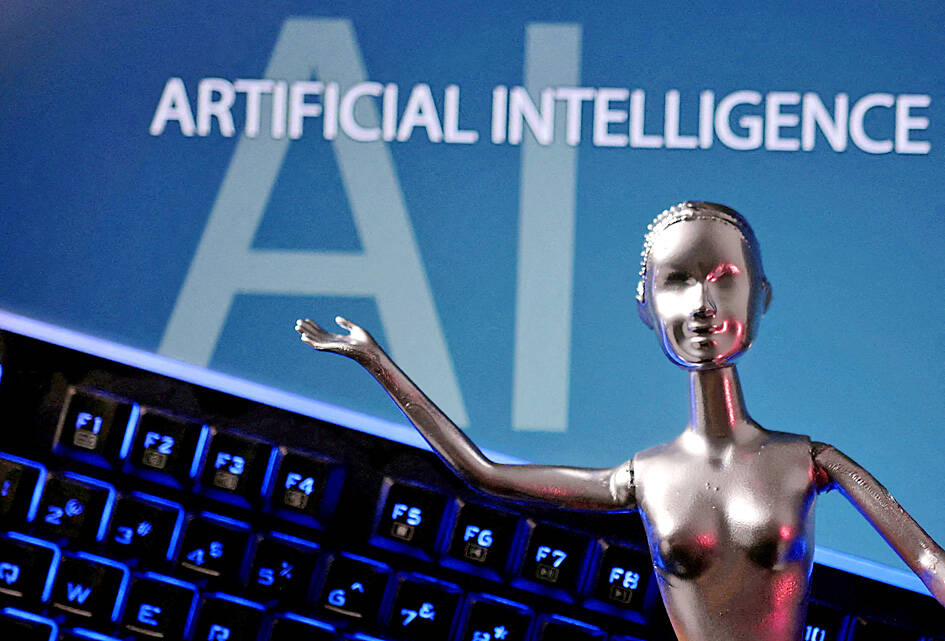The rapid adoption of generative artificial intelligence (AI) has boosted markets this year.
However, after the initial euphoria, investors are waking up to the possible risks, including the need to be highly selective in stock-picking.
Businesses ranging from information technology services and consulting to media, information and education are under portfolio managers’ microscopes to assess the potential for AI disruption.

Photo: Reuters
The overall effect on corporate profitability is seen as hugely positive. Yet, beyond Nvidia Corp and other obvious winners in the chip sector, analysts have warned there might be losers across Europe and the US.
McKinsey & Co said that generative AI could add US$7.3 trillion in value to the world economy each year and half of today’s work activities could be automated from 2030 to 2060.
However, that means corporates also face big challenges, such as redundancies and rethinking their business models, if they want to fully realize AI’s potential.
“It’s not a given that AI will only have a positive impact. There could be a deflationary effect,” said Gilles Guibout, who helps manage more than 820 billion euros (US$894.9 billion) as head of European equities at AXA Investment Managers in Paris.
In some cases, clients could negotiate price cuts, he said, while staff-light newcomers could erode existing players’ market share while they are busy redesigning their processes.
That might reduce sales growth and cause share price underperformance, especially for companies that face strong competition or where growth depends on headcount.
“Take IT services: If one hundred people are no longer needed for coding, but only half or a third of that, customers will be asking for lower prices,” Guibout said.
The latest Bank of America survey showed 29 percent of global investors do not expect AI to increase profits or jobs. That compares with 40 percent who do expect a boost.
Concerns about AI have already manifested across markets.
Shares in companies like French outsourcing firm Teleperformance SE and US-based Taskus Inc, which manage call centers and other services seen as vulnerable to being replaced by bots, have lost about 30 percent this year.
In education, the UK’s Pearson PLC slumped 15 percent one day last month after US peer Chegg Inc, down 62 percent this year, said significant student interest for the Microsoft Corp-backed ChatGPT bot was hitting customer growth.
Some analysts have said price falls have been excessive in some cases, exaggerating the concerns over earnings growth.
“There’s a lot of focus on the risks that generative AI can bring. This has ultimately become a bit overdone,” RBC Wealth Management head of equities Thomas McGarrity said.
He seemed confident over the capacity of some professional information and data providers, which own proprietary data, to integrate generative AI into their products.
Meanwhile, others remain cautious, saying the fast adoption of cheaper AI-powered offerings could slow growth as soon as order backlogs of more conventional services are fulfilled.
Lemanik Asset Management SA portfolio manager Andrea Scauri said uncertainty over AI has deterred him from investing in some IT services stocks, despite valuations looking attractive.

SEEKING CLARITY: Washington should not adopt measures that create uncertainties for ‘existing semiconductor investments,’ TSMC said referring to its US$165 billion in the US Taiwan Semiconductor Manufacturing Co (TSMC, 台積電) told the US that any future tariffs on Taiwanese semiconductors could reduce demand for chips and derail its pledge to increase its investment in Arizona. “New import restrictions could jeopardize current US leadership in the competitive technology industry and create uncertainties for many committed semiconductor capital projects in the US, including TSMC Arizona’s significant investment plan in Phoenix,” the chipmaker wrote in a letter to the US Department of Commerce. TSMC issued the warning in response to a solicitation for comments by the department on a possible tariff on semiconductor imports by US President Donald Trump’s

‘FAILED EXPORT CONTROLS’: Jensen Huang said that Washington should maximize the speed of AI diffusion, because not doing so would give competitors an advantage Nvidia Corp cofounder and chief executive officer Jensen Huang (黃仁勳) yesterday criticized the US government’s restrictions on exports of artificial intelligence (AI) chips to China, saying that the policy was a failure and would only spur China to accelerate AI development. The export controls gave China the spirit, motivation and government support to accelerate AI development, Huang told reporters at the Computex trade show in Taipei. The competition in China is already intense, given its strong software capabilities, extensive technology ecosystems and work efficiency, he said. “All in all, the export controls were a failure. The facts would suggest it,” he said. “The US

The government has launched a three-pronged strategy to attract local and international talent, aiming to position Taiwan as a new global hub following Nvidia Corp’s announcement that it has chosen Taipei as the site of its Taiwan headquarters. Nvidia cofounder and CEO Jensen Huang (黃仁勳) on Monday last week announced during his keynote speech at the Computex trade show in Taipei that the Nvidia Constellation, the company’s planned Taiwan headquarters, would be located in the Beitou-Shilin Technology Park (北投士林科技園區) in Taipei. Huang’s decision to establish a base in Taiwan is “primarily due to Taiwan’s talent pool and its strength in the semiconductor

French President Emmanuel Macron has expressed gratitude to Hon Hai Precision Industry Co (鴻海精密) for its plan to invest approximately 250 million euros (US$278 million) in a joint venture in France focused on the semiconductor and space industries. On his official X account on Tuesday, Macron thanked Hon Hai, also known globally as Foxconn Technology Group (富士康科技集團), for its investment projects announced at Choose France, a flagship economic summit held on Monday to attract foreign investment. In the post, Macron included a GIF displaying the national flag of the Republic of China (Taiwan), as he did for other foreign investors, including China-based